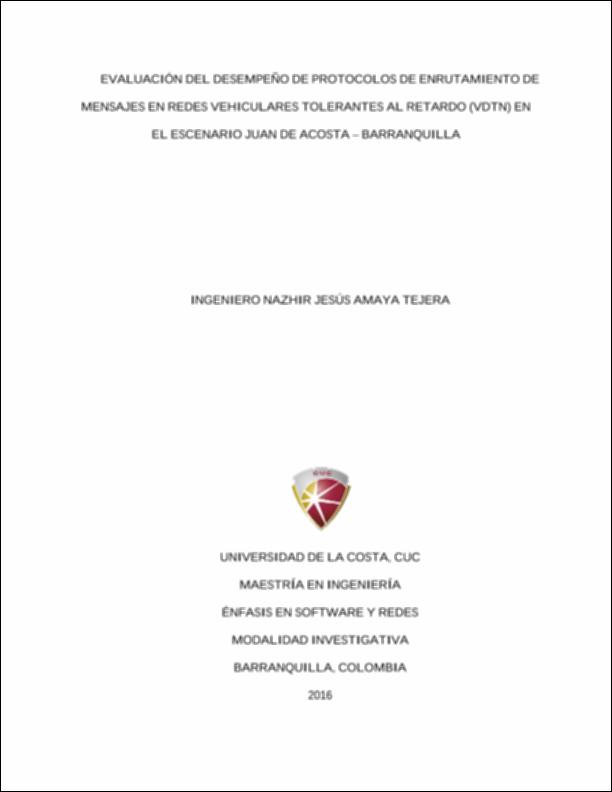Evaluación del desempeño de protocolos de enrutamiento de mensajes en Redes Vehiculares Tolerantes al Retardo (VDTN) en el escenario Juan de Acosta – Barranquilla
Trabajo de grado - Pregrado
2016-12-13
Maestría en Ingeniería
Determinados vehículos tienen la necesidad de enviar información a sus centrales de monitoreo
constantemente debido a la carga que transportan o por seguridad. Esta información es enviada
por los vehículos usualmente a través de la red celular. La disponibilidad de estas redes
inalámbricas depende de su cobertura, la cual no está disponible en todas las zonas geográficas.
Este es el caso de tramos viales donde la cobertura del servicio de datos de las redes celulares es
parcial o nula, haciendo imposible la transmisión. Un caso particular de esta situación son las
vías entre el municipio de Juan de Acosta y la ciudad de Barranquilla en el departamento del
Atlántico (Colombia). Como solución a esta dificultad, surgen las redes tolerantes al retardo que
permiten la transmisión de datos a las centrales de monitoreo cuando no se tiene cobertura de red
celular. En este trabajo se realiza una evaluación simulada del desempeño de algunos protocolos
de enrutamiento de mensajes para redes tolerantes al retardo, en el escenario Juan de Acosta –
Barranquilla. Utilizando el simulador “The Opportunistic Networking Environment”, se
determinó el desempeño de estos protocolos de enrutamiento de mensajes en este escenario. Los
resultados muestran que el protocolo de enrutamiento de mensajes First contact, presenta la
mayor tasa de entrega de mensajes (delivery rate) y el menor retardo de entrega (delivery
latency). Además, el protocolo Spray and wait, presenta un mejor resultado en la sobrecarga de
mensajes (overhead) del sistema que el primero. Certain vehicles have the need to send information to their monitoring centers. This information
is sent by the vehicles through the cellular network. The availability of these wireless networks
depends on your coverage, which is not available in all geographic areas. This is the case of road
sections where the coverage of data service of cellular networks is partial, making transmission
impossible. A particular case of this situation are the roads between the municipality of Juan de
Acosta and the city of Barranquilla in the state of the Atlantic (Colombia). As a solution to this
difficulty, delay tolerance networks allow the transmission of data to monitoring stations when
there is no cellular red coverage. In this work, a simulated evaluation of the performance of some
message routing protocols for delay tolerant networks is performed in the Juan de Acosta -
Barranquilla scenario. Using the “The Opportunistic Networking Environment” simulator, it
determined the performance of these message routing protocols in this scenario. The results show
that the First contact message routing protocol presents the highest message delivery rate and the
shortest delivery delay. In addition, the Spray and wait protocol presents better message overload
(overload) than the first.
- Posgrado [1208]
Descripción:
1044392548.pdf
Título: 1044392548.pdf
Tamaño: 1.473Mb
 PDF
PDF
 LEER EN FLIP
LEER EN FLIP
Descripción: Anexos.pdf
Título: Anexos.pdf
Tamaño: 3.651Mb
 PDF
PDF
 LEER EN FLIP
LEER EN FLIP
Título: 1044392548.pdf
Tamaño: 1.473Mb
 PDF
PDF
 LEER EN FLIP
LEER EN FLIP
Descripción: Anexos.pdf
Título: Anexos.pdf
Tamaño: 3.651Mb
 PDF
PDF
 LEER EN FLIP
LEER EN FLIP








